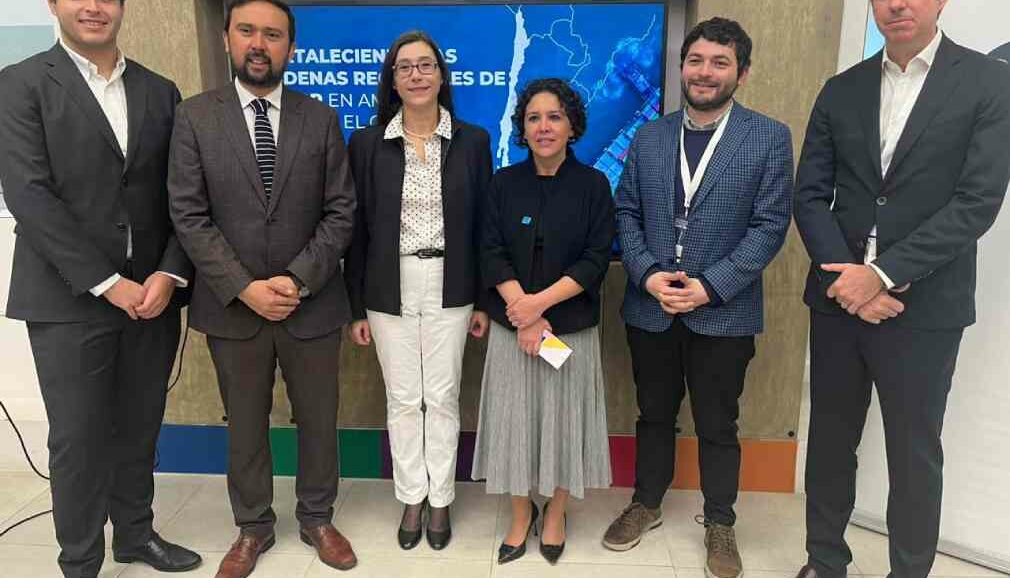
Essential information

Ñuble and Biobío: IDB and InvestChile present recommendations for boosting investment and trade

- The Inter-American Development Bank’s report provides public policy proposals to remove barriers, improve competitive factors, and develop the necessary infrastructure to strengthen Chile’s integration into the global business ecosystem.
Last week, the Inter-American Development Bank (IDB) presented its “Strengthening Regional Value Chains in Latin America and the Caribbean” report in the Biobío and Ñuble regions. Both regions, along with Tarapacá and Antofagasta, were part of the study’s focus in Chile, which is part of a five-country initiative.
The report was presented at two workshops held at the respective Regional Government offices. The Biobío workshop was led by IDB’s regional coordinator and specialist in Integration and Trade, Mikael Larsson, and the regional governor, Rodrigo Díaz. The activity in Ñuble was attended by María Florencia Attademo-Hirt, general manager of the Southern Cone Countries Department and IDB representative in Chile, and Óscar Crisóstomo, Regional Governor of Ñuble. Both workshops were attended by InvestChile director Karla Flores. This institution was the driving force behind developing the initiative.
Regional potential
The study, conducted over seven months, identifies specific opportunities to develop the sectors and products with the greatest potential for developing export and/or foreign investment projects that take better advantage of new global and regional trends. In the document, the IDB recommends a series of public policies—general and specific to each region—to maximize the opportunities identified, thus eliminating barriers, improving competitive factors, and developing the necessary infrastructure to strengthen regional and national integration at the global level.
The proposals include, in the case of Biobío, developing a land infrastructure improvement program for the efficiency and competitiveness of the productive sector, while in the case of Ñuble, the entity recommends, among other measures, accelerating an electric power transmission infrastructure investment program to guarantee the availability of energy for industrial, agro-industrial, and forestry investment projects, among others.
InvestChile director Karla Flores emphasized that the initiative is part of the ongoing drive and support that the Foreign Investment Promotion Agency provides to the country’s different regions.
“To the extent that the regions are able to detect their opportunities and gaps, we can develop a joint effort that not only means having regions that are better prepared to receive foreign investment projects, but also to take better advantage of the benefits they bring to their business ecosystem and, above all, to the quality of life of the inhabitants of each area. We want sustainable investment, which means more opportunities for each region and better jobs, and that means making an extra effort to bring regional capabilities up to global standards,” said Flores.
Regional and global integration
In this regard, María Florencia Attademo-Hirt, general manager of Southern Cone Countries and IDB representative in Chile, commented that “the IDB, as a strategic partner in the promotion of trade and investment in the region, has conducted an analysis of the opportunities for strengthening value chains at the national and regional levels, with a specific focus on Tarapacá, Antofagasta, Ñuble, and Biobío.
“In 2022, Chile generated a total of US$97,491 million in total goods and services exports and managed to attract 9% of the foreign investment that reached Latin America and the Caribbean (LAC) that year, becoming the third largest recipient of foreign direct investment in Latin America, second only to two giants such as Brazil and Mexico. Chile is also a relevant player in several value chains, thanks to its competitive advantages and an extensive network of trade agreements. It therefore has unique opportunities to strengthen its participation in some of the value chains in which it is already present, as well as to make inroads into others in which it is not yet involved,” explained Attademo-Hirt.
This opportunity, however, will not manifest on its own. Companies will continue to seek to invest where they have cost advantages, a business-friendly environment, good infrastructure and logistics, and adequate human capital, among other characteristics. In this regard, Iván Valenzuela, regional administrator of the Biobío region, valued the results of the study, emphasizing that it provided valuable conclusions for the Biobío Region to strengthen its cooperation networks with various nations around the world.
“As Regional Government we have highlighted the great virtues that Biobío has in terms of its economic and industrial capacity, as well as the difficulties we are facing with respect to the crisis of large companies. Once again, we are grateful for the work and collaboration of InvestChile in positioning Biobío as a hub for social and economic development,” said Valenzuela.
The IDB’s regional coordinator and specialist in integration and trade, Mikael Larsson, pointed out that “with increasing intensity over the past decade, global companies have begun to rethink the location of their supply chains so that they are closer to their markets, a phenomenon that has been exacerbated by the global disruptions caused by COVID-19. Today, Latin America and the Caribbean is in an ideal position to benefit from this reconfiguration of regional value chains.”







